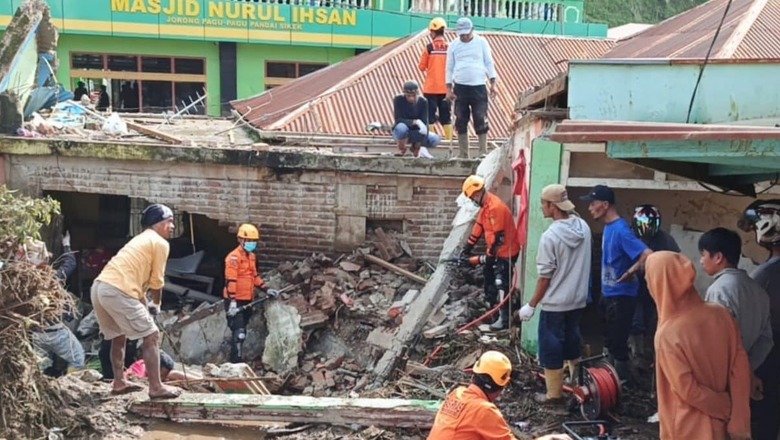
views
The number of people killed by flash floods and cold lava flow from a volcano in western Indonesia over the weekend has risen to 50 with 27 more still missing, the national disaster mitigation agency said in a statement Tuesday.
“Based on reports, Suharyanto (BNPB chief) said victims who died due to the disaster were 50 people, 27 missing, 37 injured, while 3,396 people evacuated,” agency spokesman Abdul Muhari said in a statement.
Suharyanto, who goes by one name, said in the statement that the death toll could rise further and called for heavy equipment to be deployed to help the search effort.
He said aid deliveries were being carried out using air and land routes as well as emergency bridges after the flooding and cold lava flow cut off some road access in the worst-hit areas.
Hours of heavy rain caused flooding in two districts on Sumatra island Saturday evening, threatening thousands of people after the downpours swept ash and large rocks down Mount Marapi, the most active volcano on Sumatra island.
Cold lava, also known as lahar, is volcanic material such as ash, sand and pebbles carried down a volcano’s slopes by rain.
Indonesia is prone to landslides and flooding during the rainy season.
In 2022, about 24,000 people were evacuated and two children were killed in floods on Sumatra island, with environmental campaigners blaming deforestation caused by logging for worsening the disaster.
Rescuers were still searching for 15 missing people in two districts — Agam and Tanah Datar — that were the worst hit by the floods and home to hundreds of thousands of people.
Residents said they heard rocks thundering down roads outside their homes when the heavy rains struck.
Refki Amelia, a 39-year-old mother-of-three in Agam, survived but lost her 65-year-old mother and her 15-year-old niece.
“My parents’ house was right across from my home. (My mother) wanted to run outside but did not have the time, a big rock came crashing down,” she told AFP on Monday.
“Her body was found two kilometres away. My surviving sister… is traumatised, so is her son.”
Abdul Malik, head of the local search and rescue agency in provincial capital Padang, said Sunday that the bodies retrieved included two children — a three-year-old and an eight-year-old.
Ilham Wahab, a West Sumatra disaster mitigation agency official, encouraged “people to evacuate to relatives’ places, which are safer” than tent shelters in heavy rains.
“We are focused on first, searching and rescuing the victims, second, protecting the evacuees, protecting the vulnerable people,” he said.
Provincial Governor Mahyeldi Ansharullah told reporters on Monday that around 130 people had evacuated to an elementary school in Agam, while more than 2,000 people were evacuated to several places in Tanah Datar.
Roads in the districts were turned into rivers, with mosques damaged and houses destroyed.
Muhari said 71 houses were completely swept away and 125 houses were moderately damaged.
Heavy rains inundated neighbourhoods with muddy flood waters and swept vehicles into a nearby river, while volcanic ash and large rocks rumbled down Mount Marapi.
‘Have mercy’
Authorities sent a team of rescuers and rubber boats to look for the missing victims and to transport people to shelters.
The local government set up evacuation centres and emergency posts in several areas of Agam and Tanah Datar.
The BNPB said 84 homes, 16 bridges and two mosques were damaged in Tanah Datar, as were 20 hectares (50 acres) of rice fields.
Survivors recounted their horror when the flooding and rockfall began.
“I heard the thunder and the sound similar to boiling water. It was the sound of big rocks falling,” housewife Rina Devina told AFP, adding that three of her neighbours were killed.
“It was pitch black, so I used my cellphone as a flashlight. The road was muddy, so I chanted ‘God, have mercy!’ over and over again,” she said of her evacuation to a local official’s office.
Dwikorita Karnawati, head of Indonesia’s meteorology agency, told reporters Monday that West Sumatra was a “unique location” because in parts of the province, rain could fall almost all year round.
“So the potential for floods and landslides are always present,” she said.
During the rainy season, generally from October to March, Indonesia is prone to landslides and floods.
In 2022, about 24,000 people were evacuated and two children were killed in floods on Sumatra island, with environmental campaigners blaming deforestation caused by logging for worsening the disaster.
Trees act as natural defences against floods, slowing the rate at which water runs down hills and into rivers.
Marapi’s last major eruption took place in December and spewed an ash tower about 3,000 metres (9,800 feet) into the sky, taller than the volcano itself.
At least 24 climbers, most of them university students, died in the eruption.



















Comments
0 comment